We’d just finished watching the movie Jesus Freaks when Andy asked me to marry him. It was early September… he’d planned to wait until I’d met his family in November, but we were ready to start planning our future. By all legalist appearances, we might seem unequally yoked. I was raised in a niche of an already obscure messianic movement, and he, born in and again recently returned to the church, was a traditional catholic. And yet those who know the two of us well and are able to see past the doctrines of man into the mystical hearts of God and His children, saw the inevitability of our union. Never is the material yoke naturally equalized between the two called to work together, not initially. It takes some sort of supernatural strength to put oneself with another, and in that acceptance is harmony cultivated.
Our spiritual experiences, though stemmed out of drastically varying circumstances, have bloomed toward the same aesthetical values. But such matters are not easily seen if one remains pigeon-holed toward ideas of denomination.
Shortly after getting engaged, I told Andy, “I have a really fun idea, but please don’t say no until I present it fully.”
“What is it?”
“Let’s visit four churches next Sunday.”
I needn’t have worried. Ever amiable and chill, he agreed to my random proposition as long as one of the attended churches was a catholic mass.
In Montana, you have to drive a long way before arriving anywhere, and then quite a way further in order to get to some other place. Considering this, visiting four churches might initially seem impossible… we’d spend almost as much time driving from place to place as we would be sitting in the pews.
We started our day early, already exhausted from a weekend of sewing with friends. One of my sisters joined us and we drove a little under an hour to our first church: a traditional mass in Three Forks at 8am.
My sister had never before attended a Catholic service, and I was still new to it myself. It was a very small gathering, and the priest was filling a double role: ministering here, then heading to a nearby town to repeat the Sunday sacraments once more to another congregation. The morning felt like the prelude to a revival: the people looked like they had fallen in some sort of stupor, some of them hardly dressed for the occasion, but the priest wore a green robe with tatted lace around his neck, ready to confront the ugliness of the world with truth. He spoke somberly, and between a variety of rituals, delivered a succinct homily that exhorted one to live a beautiful life of service. There were no fancy words. A simple reminder that we are set-apart, not for our own use, but God’s. My sister commented on how it felt almost stiff, and yet there was something refreshing about the sanctity of that.

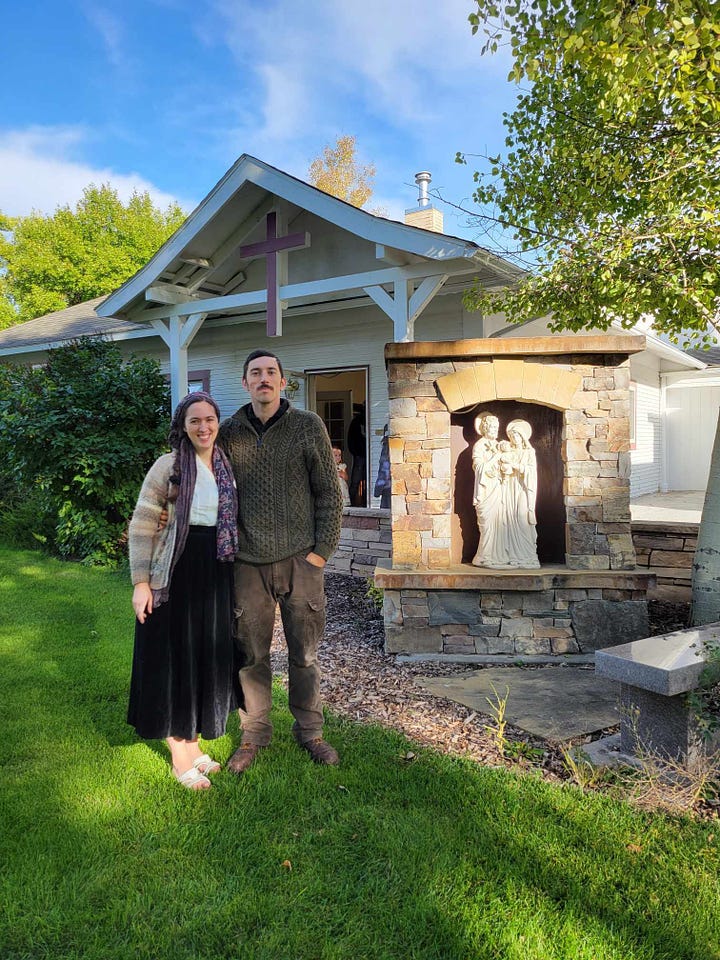
We had time for coffee and donuts with the church, then drove a good half hour for a 10:30 Dutch Reformed service. It was a larger church with a pile of pews enveloped by radiating stained glass displaying scriptures in Dutch. The music was a little livelier than mass, but the lyrics were merely repetitive, and a toned-down version of the exact same sentiments expressed at the previous church. The preacher used far less scriptures than the priest had, in fact it was bizarre to realize how much he spoke and how little he read. And yet, already a theme emerged: both priest and pastor expounded on the parable of the talents, and there for the second time we sang of the lamb of God who taketh away the sin of the world. Instead of coffee and donuts, there were chocolate chip cookies and Gatorade in the meeting hall.

The second church service was over sooner than we thought it might be, and we weren’t quite hungry enough for the picnic I’d packed. The conversations with the congregation in the meeting hall were short-lived, so we headed to staples to print photos.
The ensuing lull, unexpectedly, bizarrely won, afforded us a moment of reflection. Of the things we liked best of each place so far, of how the next place might compare, of how the churches might improve by visiting the other, etc. Our next chosen service, a sort of non-denominational Calvinist gathering, began at 2:30pm, but you could show up a little early and there would be a small assortment of food and pastries.
It was a blessed day, indeed, hitting all the churches serving food. This wasn’t a factor in my deciding which churches to attend when I chose four, but it certainly paid off and made the endeavor possible… what a better way to spend a Sunday, fellowshipping with a variety of Christians, eating food, singing different styles of songs, and hearing a constant flow of scripture—with hardly any variance of belief.
If anything, we were experiencing a walk-through of church history and the fall of holiness. In each church we witnessed less tradition, and the decline of sobriety, respect, and love for one another. Sarcasm increased and replaced humility. Juvenile crassness and demeaning comments amplified from church to church. Where the first priest may have said, “I am not worthy to be here before you today”, later degrading comments in the guise of comradery were jarringly substituted in an almost vulgar manner.
“I suppose you didn’t miss me, but you’re stuck with me anyways.”
“I know you all don’t like listening to her, but you’re gonna have to for a few moments as she tells you all about…”
The music, too changed, becoming less sober, contrived to please the senses. The songs lacked any solid profundity. They were simple ramblings of how good it felt to be a Christian, nothing exhorting us to virtue, sacrifice, and the narrow way.
It was one of those days where instead of delivering a sermon, we watched a video of some mission work being done in a third world country. The lights were dimmed and the sort of music that elicits your compassion filled the shadows around our goosebumps. There were no scriptures, no details, no actual testimonies. Just statistics and a request for monetary support. I was used to such emotional strings being tugged at by missionaries, and although I’ve never felt quite right about it, have oddly never thought much of it, until sitting next to Andy who had never witnessed such a thing. Number flashed across the screen. Mostly focusing on Egypt, they shared numerous countries and their populations (often in the tens of thousands) compared with how many people knew of Christ.
This number was shockingly low. Maybe two or three people had salvation according to their records, but there were thousands and thousands supposedly suffering without the gospel.
Andy pulled out his dumb phone and managed to pull up another number that this video conveniently left untold. There are many Christians in Egypt, albeit Coptic Christians. And they constitute the second largest religion amassing upward of ten million souls.
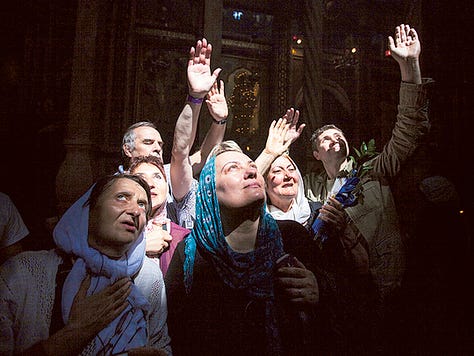
This missionary stood before the congregation speaking of how he was called to preach the gospel to those who didn’t have it and needed $50k to build a church, neglecting to tell us that he was working in a place filled with rich, Christian roots… but to give him the benefit of the doubt, we saved our judgment until we could speak with the man.
“I’m impressed you’ve heard of Coptic Christians.” He told us. No, he didn’t minister to Muslims… that would be illegal and unsafe. Yes, he was aware the Coptic Christians had the same Bible we have, but they were still unreached, because they didn’t understand salvation. Why? Because they view Mary as the third part of the trinity. Andy suggested that perhaps they didn’t, but this minister was determined that he knew how they believed better than anyone else, and then went on to say, that sure they probably weren’t all going to hell, just like Catholics aren’t all lost. They are a worked based faith, he went on. Yes, they have better family values, and we can learn a lot about how to be hospitable from them. But unfortunately, they don’t know how to read the Bible.
It was horrifying.
Not once did he mention in his presentation that he was only preaching to people who already had the Bible. Not once did he clarify that he wanted funds to build a church for a people that already had a church… nor that their church, ancient and beautiful, would be replaced by some drab structure lacking any meaningful aesthetic. And to think that he requested so much to build such a simple, ugly building in a place rich of culture despite poverty… why would it cost so much anyway? Was this just a profitable scheme to confuse the innocent? And yet, others in the church also knew of the Coptic Christians and supported the endeavor, not questioning the outrageous requested sum, because they sincerely believed that they had truth salvation, and these people of ancient practice and faith did not. But the Muslims… they did not care to go to prison to save their souls. It was wrong, after all, to disobey the government.
For a moment curiosity was piqued in that direction during potluck. But the Appalachian missionary in his fitted suit said, “I don’t won’t to ruin your appetite by speaking of unsavory, politically incorrect subjects.”
And so, in their ignorance, these brash, vulgar people did what was right in their own eyes, giving away their money to deconstruct a heritage they knew nothing of, and deemed worthless, conflating their self-righteousness for nobility. It grew to be too much, and so we left, repulsed and wishing for some table to turn over.
This third church further cemented what we saw at the second church: a lack of respect for holy things invites a crude approach to our relations with our neighbors. Andy accredited this to the protestant separation from the Catholic church, somewhat initiated by Martin Luther. He argues that the belief “I know better than the church” never stops, and divisions will continue to splinter until every man is reading the Bible alone, with no neighbor to love, unless he submits himself to the highest, original authority: the catholic church.
I had suggested we do this experiment mostly because I wanted him to understand some of my upbringing and associations, but the comparisons were showing me new things I’d never fully faced despite my years of attendance, and in no other possible way, I was starting to understand what Andy meant. But I felt there must be something deeper even than that… aren’t divisions inevitable where corruption remains? How can the protestants be blamed for their sin of going away, when the Catholics originally separated themselves from the Jews, the original schism.
There are serious, wistful whispers of reuniting the orthodox and the Catholics, and of the protestants return as the final repentant prodigal. This retvrn to tradition, solemnity, and harmony would do something beautiful for Christianity on a whole… but I still believe the fractions are impossible to rectify without a deeper understanding of heritage. We must look further back to the first schism, the one between Jacob and Esau, between the Muslims, the Jews, and the Catholic church, and their unwillingness to be children of the same, Holy God, and of man seeing this weak spot and using it for his own glory, therefore defaming the name of God and the resurrection of the One Saviour who died that all might be saved, the jew and the gentile.
We fell to the very bottom of history and came full circle to early Christian practice all at once, experiencing the non-linearity of religion and faith: a home gathering at 6pm. We left town and headed deep into an abandoned Amish settlement. At the end of a long ranch road, we pulled up outside of a three story off-grid farmhouse—it still looked like an Amish house despite the cluster of vehicles parked haphazardly between the pigpen and barn. These were old friends of my family, but even Andy settled right in at home on their couch amidst the gathered, pouring his heart out in prayer with these people he’d just met.
A teenaged boy chorded on the piano, and we all sang loudly, with abandon. It was everything combined: the beginning, the decline, and the revival. There was no structure… there was a cry for direction. We sang more than we talked and prayed even more. We treated each other with respect, those who were tempted into sarcasm instead showed their wounds, and nobody threw a stone. This was fellowship, communion, and a mending of schisms, where the Jew and catholic and protestant at last reconvene and let go of their own understandings of what it means to be a good person and listen to Jesus.
You are my people.
It isn’t a “you” vs “you”. There is no “but he doesn’t read the Bible how I read the Bible” when we put aside the minds of literate, all-knowing men. It isn’t about who left first, or who left at all, but rather a recognizing of togetherness. The schism is material, imaginary, and evil. There is no individual, no unique testimony. We are all prodigal sons, each given some great talent to cherish and increase and tend over. We all have the same purpose and mission, and it is not to be alone in our bedrooms, saying our own prayers, discovering our own truths, worried over our own bodies, souls, and pride.
When we look past the ways of men, of modern, lackluster ugliness and unequitable beauty of the old ways, we walk in the mystical realm. We lay aside our desire to be right and whole, and we become the gospel. There are no words, no books, no bible, not even rituals or prayers or songs.
The proof is in the pudding: if our table is not well-laid and crowded, with something of bread and wine present, then we have missed the boat, remaining in our own abode, screaming irreverently, “But I am right!” There is no lingering, fiery taste of hell in the saint’s praise.
Yes, the way is straight and narrow, but the ditches are not filled with liter; there are wildflowers on God’s path. Can truth be some collection of ugly facts? Can it, even when most difficult to swallow, ever be ugly? Is it not something that draws the lost to the light, something that shows the way to beauty, that reconciles us to that which we wish to reject because of fleshly pride. Because of my love for beauty, and my disdain for the modern robotic method living life and going to church, it seems as if I ought to be orthodox or catholic to those who know anything about such matters. But because I was raised protestant, I think somewhat like one, and I can’t help but insist that the rift of the church is deeper and simpler than we might like to believe.
We have a problem of irreverence toward one another, and it’s much deeper than any one rebellion. Protestants must submit to the ancient church. The schism between the Catholics and Orthodox should be rectified. The Holy Church will be made whole when God’s people are remembered and reclaimed. And this can’t happen until the Jews acknowledge Jesus as Master and the Muslims as their brother. It is undeniable that it is God’s will for all of us to be reconciled into His Kingdom, and yet we continue to strive and convert others to our ways of thinking, instead of submitting ourselves one to another.
Visiting four churches in a single day is a bit of a spiritual overdose—evoking mystical memories of the early church led me to a deeper love of all churches, especially those saturated in ancient tradition. Perhaps man has made it all up. But I much prefer the beauty men have thought to do with their hands to the words they babble to themselves and divide over. It makes me wonder: is being equally yoked a matter of thought or action?

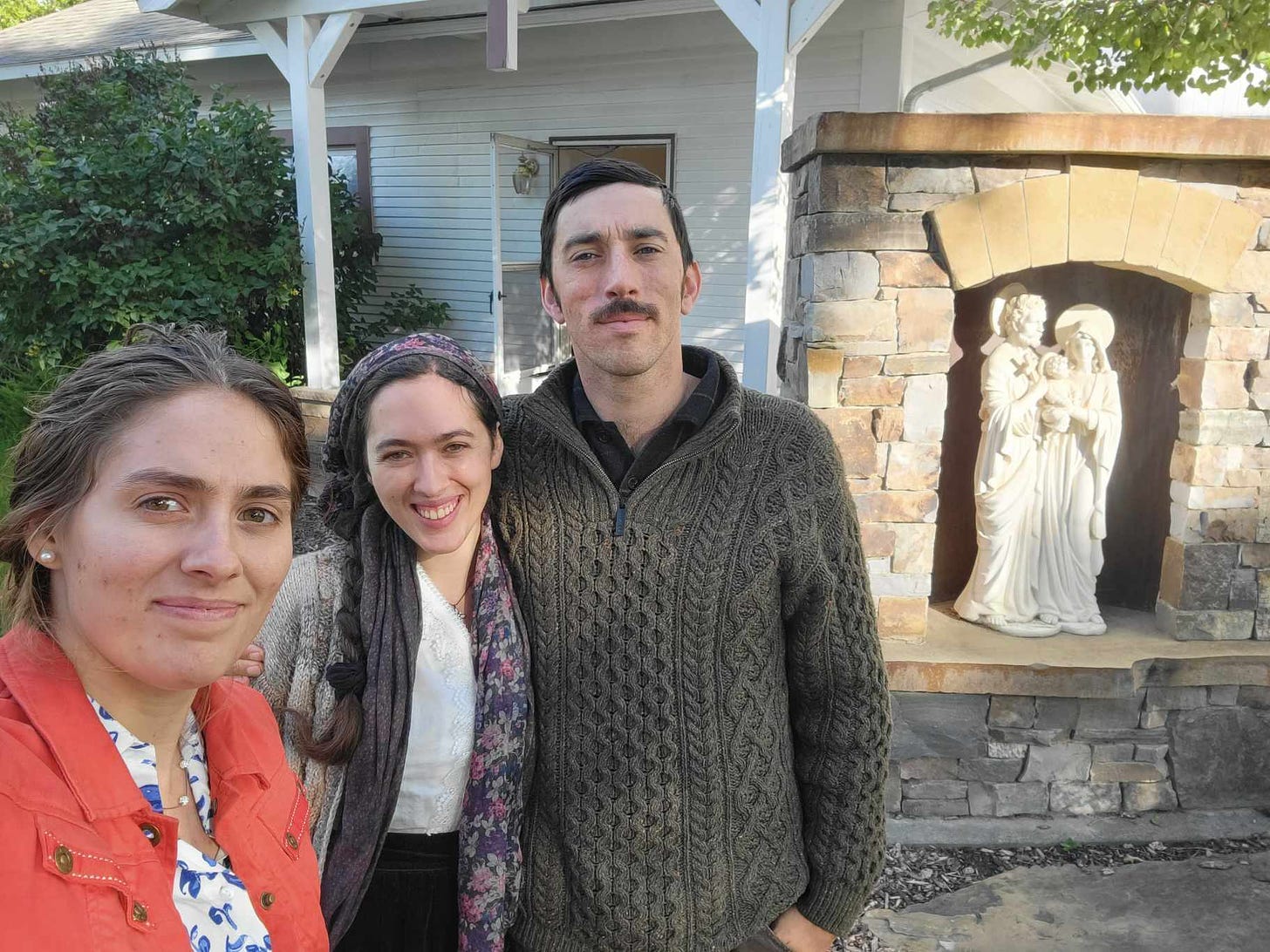

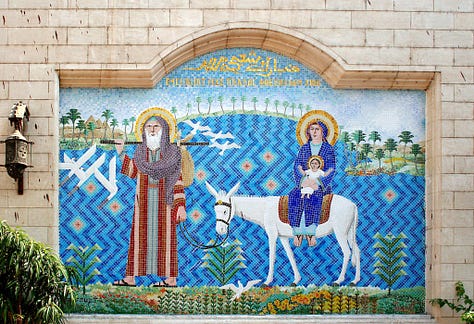
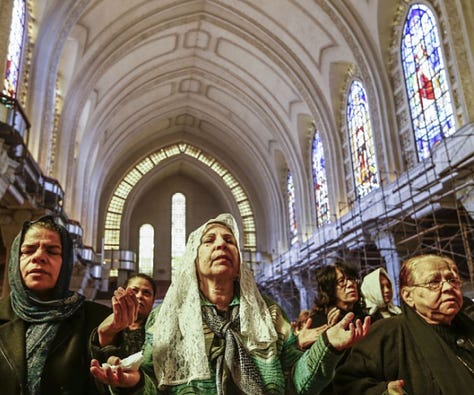


This was a really interesting post! First of all, I think your point that no one is initially equally yoked is a super valid one. No two people are going to be the "perfect partners" for each other right off the bat. Growth together is necessary for that, at least, from what I hear. :)
ReplyDeleteHaving been to a variety of Traditional Catholic Masses (I usually attend a small-t traditional Catholic Mass...English and Latin with traditional music and such) I know exactly what you were describing with your description of the Mass you were at...it can be a very strange atmosphere, but it's often very beautiful, as well. (I in particular find it very easy to pray at a Traditional Mass.)
Having not been to any sort of Protestant service (outside of one in the Czech Republic, which I didn't understand, not speaking Czech myself) I find your observation that in each church there was a decline of tradition and virtue fascinating. It's what I maybe would have hoped to predict, based on church history, but not necessarily what I would have predicted...if that makes sense. I have high expectations for the Catholic church, but I'm aware that they're not always met in reality. :)
And the fact that one of the churches was trying to gather funds to convert Coptic Christians is just flabbergasting, and not in a good way.
I absolutely agree with you that unity between all Christians, and between Christians and Jews and Muslims is absolutely necessary...and all of your thoughts on that are really beautiful. But I would argue that perhaps the Catholic Church didn't separate themselves from the Jews so much as the Jews refused to follow them...the Jews who did follow Jesus apart from the Jews who didn't not because of lack of desire to be one people, but because the followers of Jesus were called to something higher, and while they tried to bring their brethren along, their brethren resisted. And that was the original schism...and it's a tragedy. But even so, the sin of separation from the church (by the protestants) remains a sin, I think, because the argument that "they [the Catholics] did it, therefore I can, too" is not one that holds much weight.
Hoping all that rambling makes sense...I'm writing this not long before I go to bed, so I'm a little sleepy.
Thank you for sharing all these thoughts!!! I'm glad it resonated! Yes, it is true the Jews didn't follow along, but I think I mostly referred to the texts where Catholic leaders would say things like "We must not look like that abomination, the Jews" and how they held a sort of disdain and hatred for the people instead of necessary respect, or even an invitation to at least try and share something with them. They may have been led to the gospel through a hospitality and generosity, but instead a rift was created, even if initially it may have been the Jews fault. IDK if that makes sense, but it's something I've thought a lot about... what if Catholics had paid as much attention to the Jews as they did pagans... perhaps the Jews wouldn't have felt further validated in their own hatred for "gentiles". But we're dealing with human nature now, so who knows.
Delete